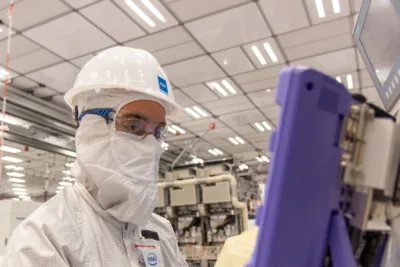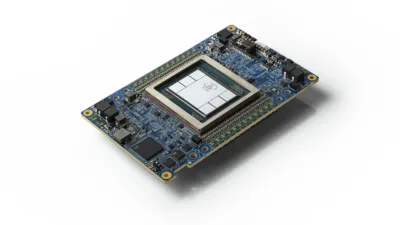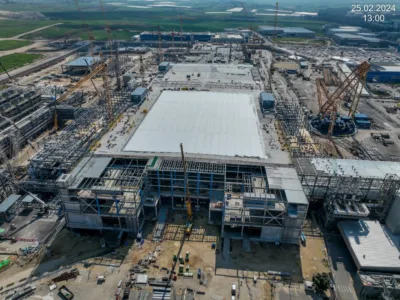By: Roni Lifshitz, News Editor, Techtime
The Israeli economy is technology export-oriented with an extraordinary rate of growth. The Innovation Authority in the Ministry of Economy recently reported that high-tech was recognized in 2018 as the main growth generator of the Israeli economy, and was responsible for about 40% of growth in GDP between 2018-2024. The Israeli high-tech sector currently employs about 400,000 workers in about 9,000 different companies, including about 500 development centers of multinational companies such as IBM, Microsoft, Intel, Nvidia, HP and other major giant companies. In fact, high-tech is responsible for about 53% of the exports of the State of Israel and is growing rapidly.
It is true that most of Israel’s high-tech industry focuses mainly on software and information technologies, but the semiconductor industry, which employs several tens of thousands of workers in several hundred companies, is considered the shining star and has a profound influence on the entire Global industry. A survey conducted by the SEMICO organization for ARM in 2020 revealed that Israel ranks second after the USA in the number of semiconductors Startups. More than 50% of the investments in start-up companies from the field of semiconductors made in Europe – were in Israeli companies. The scope of investments in Israel was greater than the total volume of investments made in Germany, the United Kingdom, France, the Netherlands and Switzerland – all together.
Products that changed the Global semiconductor industry
The Israeli semiconductor industry was built gradually over almost 50 years. In the 60s of the 20th century, the government decided to create a local knowledge center following the French arms embargo, and encouraged the academic research institutions to obtain and produce advanced scientific and engineering knowledge in the field. In the late 1970s, semiconductor development centers of major companies such as Intel, National Semiconductors and Motorola were opened that later led to the establishment of local manufacturing plants and the building of a vibrant environment of start-up companies, whose funding came in the first years through government funding programs. These provided budgets and incentives to local and international venture capital funds. The result was that starting in the 1990s, an original and innovative industry gradually grew in Israel, which gradually gained reputation and success.
Many major technological products began their journey in Israel, including those that changed the Global semiconductor industry. One of the most famous in the world is the portable memory drive (USB Flash Drive) which was invented in the 90’s by M-Systems. M-Systems was later sold to SanDisk for USD 1.5 Billion. This drive changed the Global computing industry and is still considered one of the best-known products in the world.
Today it is hard to remember that until the 1990s all telephone communication in the world was carried out through dedicated, slow and very poor quality telephone lines. This situation changed almost at once in 1995 when the small company Vocaltec released a phone that worked directly over Internet Protocol (VoIP). Although it was initially a software product, the industry quickly adopted the protocol, and since then millions of Internet-based communication semiconductors have been manufactured worldwide. Today, all Global communication is carried out over VoIP infrastructures of various types.

Intel’s Cleanroom Photo: Intel
Israeli innovative products and technologies
The biggest and most sustained success is probably that of Intel processors. Intel started operating in Israel in 1974 as a development center. In 1980 it established a manufacturing plant in Jerusalem, and in 1999 it opened a manufacturing plant complex in the northern Negev (Kiryat Gat) which produces the company’s most advanced semiconductors. It achieved the status of a central branch following extraordinary success: in the 1980s, the development engineers of Intel Israel began to take on central development tasks, which later turned out to be extremely important. MMX technology was developed in Israel which integrated graphic processors inside CPU processors and later the Israeli engineers developed the first Intel processor for Mobile Computers. The legendary CEO of Intel, Andy Grove, said about this product that it saved Intel worldwide from bankruptcy.
Even today, the Israeli engineers are responsible for the company’s key developments: the Lunar Lake processor for mobile computers, announced in June 2024, was developed in Israel. The high-speed Thunderbolt communication interface was developed in Israel, and all of Intel’s Gaudi artificial intelligence processors were developed in Israel following the USD 2 Billion acquisition of Habana Labs in 2019
.
Intel is associated with another semiconductors revolution born in Israel: Jerusalem based Mobileye has invented an unusual image processor that extracts information about the road from data produced by a standard video camera. In 2008, it released its product, the EyeQ1 processor, which was the first safety accessory in the field of Advanced Driving Assistance Systems (ADAS) and has since been installed in its various versions in tens of millions of cars from more than 300 leading car manufacturers, including companies like BMW, Volkswagen Group, Hyundai, Ford, Renault and more. In fact, Mobileye turned ADAS from a futuristic technological vision into a practical product, which changed the face of the modern car. Intel acquired Mobileye in 2017 for $15.7 Billion in cash. In 2022 it was separated from Intel and became an independent company traded on the NASDAQ stock exchange.
Intel is not the only semiconductor company that relies on Israeli engineers for the development of core products. Key components of companies such as Apple, Samsung, Broadcom, Marvel, Amazon and other semiconductors giants are developed in strategic development centers in Israel. A clear example of this is Mellanox, which developed components and systems for InfiniBand communication and fast Ethernet communication at data centers. Nvidia purchased it in 2020 for USD 6.9 Billion. Thanks to this deal, Nvidia was able to provide an end-to-end solution for the cloud industry, and became the world’s leading company in the field of artificial intelligence. Today, the Israeli development center is also involved in the development of the future central processor unit (CPU) of Nvidia.

It is impossible to describe the Israeli semiconductor industry without Tower Semiconductor. The company began its journey in 1984, when the National Semiconductor Company established a production plant in the town of Migdal Haemek in the Galilee. In 1993, it decided to close it due to a crisis in the Global semiconductors market, but the local managers of the plant managed to organize a purchasing group, which bought it from National Semiconductor and began to operate it as an independent company. The first years were difficult, but Tower managed to develop proprietary technologies of Mixed-Signal, Power Management components and CMOS Image Sensors, which made it a very attractive manufacturing service contractor for many customers.
Today the company employs about 5,500 people and operates two production facilities in Israel (150 mm and 200 mm) and two production facilities in the USA (200 mm). In addition, it manages two production facilities in Japan as part of TPSCo, which is affiliated with it and Nuvoton. It is also a partner in a manufacturing facility with the French-Italian semiconductor maker ST in the town of Agrata in Northern Italy (at the foot of the Alps) and in Intel’s Fab 11X manufacturing plant located in Rio Rancho, New Mexico and USA. Its sales in 2023 amounted to approximately USD 1.42 Billion.
A world power in the field of quality testing
The Israeli influence on the Global semiconductor industry is also felt “under the hood”, in the production lines themselves. Since the production process in this industry is lengthy, very complex, and includes thousands of distinct steps that must be carried out with very high precision (accuracy on the order of a few nanometers), the tests and measurements carried out during the production are of enormous importance. These tests are performed using electron microscopes, special X-ray equipment, optical systems based on ultraviolet radiation (EUV) and other techniques. These testing machines are located in the production lines and monitor the construction process of the components. When they identify an abnormality, they characterize it and provide a recommendation as to whether it is possible to make improvements to the process or to stop production immediately, before financial damage occurs.
In this specific field, of quality checks in the production process, Israel is no less than a world power, holding, according to the accepted estimate in the industry, about a third of the entire world market (estimated at about USD 6 Billion). Global giants such as Applied Materials, LAM Research or Bruker develop their most advanced measuring and testing equipment in Israel. For example, Applied Materials operates in Israel as an independent business division PDC – Process and Diagnostic Control, which is focused on the development and production of semiconductor production control systems. It is the company’s largest R&D center outside the US. It employs approximately 2,400 people and includes development laboratories, production halls and clean rooms. This division developed the company’s eBeam (electron microscope), used to identify and characterize defects that, due to their size, cannot be detected by optical systems.
In 2022, it revealed a technological breakthrough: Cold Field Emission technology, which allows an electron microscope to be operated at room temperature and not at the conventional temperature of about 1,500°C. The CEO of Applied Materials, Gary Dickerson, estimated that sales of this technology will quadruple during 2024. There are also independent Israeli companies that are considered world leaders, such as Nova and Camtek.
The weight of this activity is so important that when the European Union decided to develop new technologies for the production of semiconductor devises on 450 mm silicon wafers, it established a consortium of companies in the field of test equipment – which was managed from Israel.

Construction works at Intel’s production plant in Kiryat gat, Israel Photo: Roni Lifshitz
Want to know more about the electronics industry in Israel? Access https://techtime.news/



